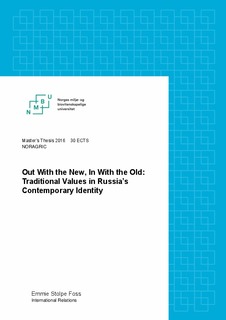| dc.contributor.advisor | Stuvøy, Kirsti | |
| dc.contributor.author | Foss, Emmie Stolpe | |
| dc.date.accessioned | 2016-08-22T09:11:55Z | |
| dc.date.available | 2016-08-22T09:11:55Z | |
| dc.date.issued | 2016-08-22 | |
| dc.identifier.uri | http://hdl.handle.net/11250/2400232 | |
| dc.description.abstract | Since Putin’s rise to power in Russia there has been a rise of traditional values in Russia’s contemporary identity. This became especially clear in the period following his reelection in 2012. These traditional values have manifested themselves in several ways, both nationally and internationally and affect the way Russia act in certain situations. Most notably is the treatment of Russian LGBT individuals, Russia’s stance as anti-interventionist and a strong anti-Western sentiment. This thesis explores what the role of traditional values in Russia’s contemporary identity is, and what the effects of these values are. It does this through a discourse analysis of three selected Putin speeches and a case study of 2014 Sochi Olympics and the protests and campaigns that surrounded it. It also includes a discussion on the role of masculinity in Russia and a discussion surrounding the Crimea conflict as part of Russia’s contemporary identity formation.
The discourse analysis of the speeches shows that traditional values play an important role in Russia’s contemporary identity, that family is the cornerstone of contemporary Russia, and that children needs to be protected at all costs. The speeches also show a clear anti-Western sentiment that was rooted in the West’s lack of moral due to their liberal policies, especially in regards to LGBT rights. The Sochi case study show that the outside perception of Russia as negative did not have a negative impact on the role of traditional values in Russia’s contemporary identity but rather the opposite. The case showed that when Russia is met with opposition in regards to LGBT rights, it will only increase the focus on traditional values. The opposition gave Putin something to rally around, and a clear “enemy” to defeat. This showed that the way the protests around Sochi were constructed was not the proper way to improve the state of LGBT rights in Russia.
This thesis argues that Russia’s focus on traditional values is both political and ideological. The role of traditional values stem from a need to increase Putin’s power and standing within Russia by implementing more traditional values and playing on masculinity, and at the same time showing the world that Russia is an alternative to the liberal West; Putin and Russia are looking for more international power and a way to regain their old power position. It is ideological because of the clear bond between the implementation of traditional values and the belief of the Russian Orthodox Church. | nb_NO |
| dc.language.iso | eng | nb_NO |
| dc.publisher | Norwegian University of Life Sciences, Ås | |
| dc.rights | Navngivelse-Ikkekommersiell-IngenBearbeidelse 3.0 Norge | * |
| dc.rights.uri | http://creativecommons.org/licenses/by-nc-nd/3.0/no/ | * |
| dc.subject | identity formation | nb_NO |
| dc.subject | Russia | nb_NO |
| dc.subject | LGBT rights | nb_NO |
| dc.subject | Russia and masculinity | nb_NO |
| dc.subject | traditional values | nb_NO |
| dc.subject | aspirational constructivism | nb_NO |
| dc.title | Out with the old, in with the new : traditional values in Russia's contemporary identity | nb_NO |
| dc.type | Master thesis | nb_NO |
| dc.subject.nsi | VDP::Social science: 200::Political science and organizational theory: 240::International politics: 243 | nb_NO |
| dc.subject.nsi | VDP::Social science: 200::Women's and gender studies: 370 | nb_NO |
| dc.source.pagenumber | 60 | nb_NO |
| dc.description.localcode | M-IR | nb_NO |

